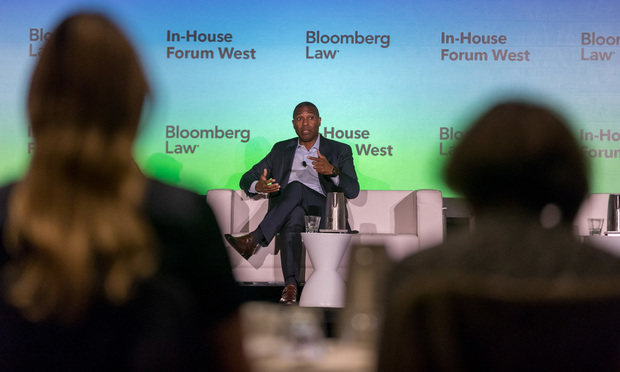Uber's Top Lawyer Vows Fight as California Embraces Sweeping New Labor Rules
Legal threats loom as worker classification legislation, Assembly Bill 5, heads to the governor's desk. The new rules could upend how the gig economy is structured.
September 11, 2019 at 06:21 PM
5 minute read
 Tony West, Uber SVP chief legal officer delivers a keynote address at Bloomberg Law's In-House Forum West. Credit: ALM
Tony West, Uber SVP chief legal officer delivers a keynote address at Bloomberg Law's In-House Forum West. Credit: ALM
Gov. Gavin Newsom was poised Wednesday to sign new worker-classification rules that threaten to upend the gig economy, raising fresh criticism from the top lawyer at Uber Technologies and setting the stage for a likely wave of new lawsuits across industries.
After hours of debate Tuesday night and Wednesday morning, state lawmakers sent Newsom Assembly Bill 5, a measure that will codify a landmark California Supreme Court ruling last year. That decision made it more difficult for gig companies not to classify their workers as employees entitled to wider protections such as minimum wage and benefits. Newsom has said he will sign the bill.
"Today the Legislature made it clear: we will not in good conscience allow free-riding businesses to profit off depriving millions of workers from basic employee rights that lead to a middle-class job," said the bill's author, Assemblywoman Lorena Gonzalez, D-San Diego. "It's our duty to look out for working men and women, not Wall Street and their get-rich-quick IPOs."
In a call with reporters less than an hour after AB 5 passed in the Assembly, Uber chief legal officer Tony West said the company has no immediate plans to reclassify its drivers as employees and instead will consider legal and political alternatives, including a potential 2020 ballot measure.
The state Supreme Court's ruling and the new law, which will take effect Jan. 1, do not automatically give on-demand workers employee status. Instead, employers must apply a new three-prong test outlined by the California Supreme Court—in the case Dynamex Operations West v. Superior Court—to determine if they can continue treating workers as independent contractors.
"Having to take a harder test does not determine the outcome of the test," said West, who insisted that Uber can meet the new legal threshold to continue to classify its drivers as independent contractors.
That stance will almost assuredly invite lawsuits from Uber workers, who are widely covered by arbitration agreements, and California city attorneys, who were empowered by late amendments to the bill to seek injunctive relief from companies that don't comply with the law.
Gonzalez told the San Francisco Chronicle on Wednesday that she added provisions giving city attorneys the power to ensure the law's enforcement.
"It's insulting for these companies, these billion-dollar companies, to walk into an office and say, 'We don't care what the law is,'" she said.
West said Uber did not oppose AB 5 until the language empowering city attorneys was added to the bill late last week. Uber spent more than $181,000 lobbying on the bill and other matters in the second quarter this year, according to state records.
How Companies Might Sue
West did not say which legal options the ride-hailing company may pursue, although at least one observer said the many industry carve-outs in AB 5 for lawyers, doctors, fishermen and other professionals may provide a litigation target.
"One potential avenue may be an equal protection theory—the idea that given the exemptions that have been established that there's not a basis for treating them equally," said William Gould, a professor emeritus at Stanford Law School.
Gould said the bill may also run afoul of federal law governing the trucking industry. AB 5 does grant exemptions to subcontractors who provide construction trucking services and it does specify that truck owners can work as employees of trucking companies.
Sean Gentry, an employment litigation partner with Ad Astra Law Group in San Francisco, said legal challenges to the legislation based on industry-specific exemptions would probably be "an uphill climb."
"The Labor Code and wage orders have always contained specific nuances for different industries," he said.
Despite the criticism of the Dynamex ruling and AB 5, they do provide employer- and worker-craved clarity that an earlier worker classification standard did not, he said. "In the short term you'll see a lot of heartache," Gentry said. "But in the long run it offers more clarity."
Uber, Lyft and DoorDash have contributed a combined $90 million to a campaign account that would fuel a 2020 ballot initiative to create a new classification for gig workers, one that West said would offer benefits and minimum pay without providing employee status.
Newsom told The Wall Street Journal on Wednesday that he has continued to negotiate with the on-demand companies in hopes of avoiding an initiative fight next year.
Read more:
Late Changes to California Labor Bill Would Empower City Attorneys
Big Law Partner Joins Lobbying Blitz Against Pro-Employee 'Dynamex' Bill
Uber GC Urges Companies to Be Intentional in Hiring Diverse Outside Counsel
9th Circuit: 'Dynamex' Worker Classification Test Applies Retroactively
This content has been archived. It is available through our partners, LexisNexis® and Bloomberg Law.
To view this content, please continue to their sites.
Not a Lexis Subscriber?
Subscribe Now
Not a Bloomberg Law Subscriber?
Subscribe Now
NOT FOR REPRINT
© 2025 ALM Global, LLC, All Rights Reserved. Request academic re-use from www.copyright.com. All other uses, submit a request to [email protected]. For more information visit Asset & Logo Licensing.
You Might Like
View All
Morgan Lewis Shutters Shenzhen Office Less Than Two Years After Launch

Texas-Based Ferguson Braswell Expands in California With 6-Lawyer Team From Orange County Law Firm
2 minute read

Justin Baldoni Sues Blake Lively and Ryan Reynolds for $400M in New Step in 'It Ends With Us' Fight
6 minute readTrending Stories
- 1'A Death Sentence for TikTok'?: Litigators and Experts Weigh Impact of Potential Ban on Creators and Data Privacy
- 2Bribery Case Against Former Lt. Gov. Brian Benjamin Is Dropped
- 3‘Extremely Disturbing’: AI Firms Face Class Action by ‘Taskers’ Exposed to Traumatic Content
- 4State Appeals Court Revives BraunHagey Lawsuit Alleging $4.2M Unlawful Wire to China
- 5Invoking Trump, AG Bonta Reminds Lawyers of Duties to Noncitizens in Plea Dealing
Who Got The Work
J. Brugh Lower of Gibbons has entered an appearance for industrial equipment supplier Devco Corporation in a pending trademark infringement lawsuit. The suit, accusing the defendant of selling knock-off Graco products, was filed Dec. 18 in New Jersey District Court by Rivkin Radler on behalf of Graco Inc. and Graco Minnesota. The case, assigned to U.S. District Judge Zahid N. Quraishi, is 3:24-cv-11294, Graco Inc. et al v. Devco Corporation.
Who Got The Work
Rebecca Maller-Stein and Kent A. Yalowitz of Arnold & Porter Kaye Scholer have entered their appearances for Hanaco Venture Capital and its executives, Lior Prosor and David Frankel, in a pending securities lawsuit. The action, filed on Dec. 24 in New York Southern District Court by Zell, Aron & Co. on behalf of Goldeneye Advisors, accuses the defendants of negligently and fraudulently managing the plaintiff's $1 million investment. The case, assigned to U.S. District Judge Vernon S. Broderick, is 1:24-cv-09918, Goldeneye Advisors, LLC v. Hanaco Venture Capital, Ltd. et al.
Who Got The Work
Attorneys from A&O Shearman has stepped in as defense counsel for Toronto-Dominion Bank and other defendants in a pending securities class action. The suit, filed Dec. 11 in New York Southern District Court by Bleichmar Fonti & Auld, accuses the defendants of concealing the bank's 'pervasive' deficiencies in regards to its compliance with the Bank Secrecy Act and the quality of its anti-money laundering controls. The case, assigned to U.S. District Judge Arun Subramanian, is 1:24-cv-09445, Gonzalez v. The Toronto-Dominion Bank et al.
Who Got The Work
Crown Castle International, a Pennsylvania company providing shared communications infrastructure, has turned to Luke D. Wolf of Gordon Rees Scully Mansukhani to fend off a pending breach-of-contract lawsuit. The court action, filed Nov. 25 in Michigan Eastern District Court by Hooper Hathaway PC on behalf of The Town Residences LLC, accuses Crown Castle of failing to transfer approximately $30,000 in utility payments from T-Mobile in breach of a roof-top lease and assignment agreement. The case, assigned to U.S. District Judge Susan K. Declercq, is 2:24-cv-13131, The Town Residences LLC v. T-Mobile US, Inc. et al.
Who Got The Work
Wilfred P. Coronato and Daniel M. Schwartz of McCarter & English have stepped in as defense counsel to Electrolux Home Products Inc. in a pending product liability lawsuit. The court action, filed Nov. 26 in New York Eastern District Court by Poulos Lopiccolo PC and Nagel Rice LLP on behalf of David Stern, alleges that the defendant's refrigerators’ drawers and shelving repeatedly break and fall apart within months after purchase. The case, assigned to U.S. District Judge Joan M. Azrack, is 2:24-cv-08204, Stern v. Electrolux Home Products, Inc.
Featured Firms
Law Offices of Gary Martin Hays & Associates, P.C.
(470) 294-1674
Law Offices of Mark E. Salomone
(857) 444-6468
Smith & Hassler
(713) 739-1250






